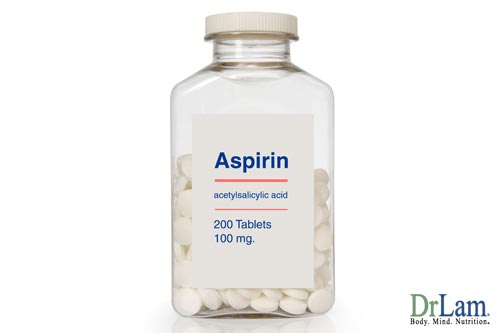 Millions of people worldwide are taking natural blood thinners for hypercoagulation. Millions of others are prescribed aspirin (a blood thinner) to prevent arteriosclerosis, despite side effects such as gastric irritation and bleeding.
Millions of people worldwide are taking natural blood thinners for hypercoagulation. Millions of others are prescribed aspirin (a blood thinner) to prevent arteriosclerosis, despite side effects such as gastric irritation and bleeding.
Can herbs such as gingko and nutritional supplements such as vitamin E interact with blood thinners? The answer is Yes, and you should know about it.
The following Frequently Asked Question is an excerpt from the October 15, 1997, issue of American Family Physician.
When you get a cut, your body stops the bleeding by forming a blood clot (a thickened mass). Substances in your blood (called proteins) work with tiny particles (called platelets) to form the clot. Forming a clot is called "coagulation." Coagulation helps when you are injured because it slows blood loss. However, your blood shouldn't clot when it's just moving through your body. If blood clots inside your blood vessels, it's called "thrombosis" or "phlebitis." The tendency to clot too much is called "hypercoagulation," and it can be very dangerous.
When abnormal clots occur, they usually form inside veins (the vessels that carry blood to the heart). A clot inside a blood vessel is called a "thrombus." Sometimes the thrombus can travel in the bloodstream and get stuck in your lungs. This kind of clot, called a "pulmonary embolus," keeps blood from getting to your lungs. A pulmonary embolus can be life-threatening and a good reason to start looking at natural blood thinners.
A clot that blocks a blood vessel in the brain can cause a stroke. A clot in a blood vessel in the heart can cause a heart attack. Blood clots can also cause some women to miscarriage.
In addition to proteins that help with clotting, your blood also has some proteins that prevent clotting and act as natural blood thinners. Some of these proteins that act as natural blood thinners are protein C, protein S and antithrombin III. Usually, these anti-clotting proteins and natural blood thinners are strong enough to stop clotting in the veins when it shouldn't happen.
However, certain situations or risk factors can make it easier for your blood to clot too much. These situations include the following:
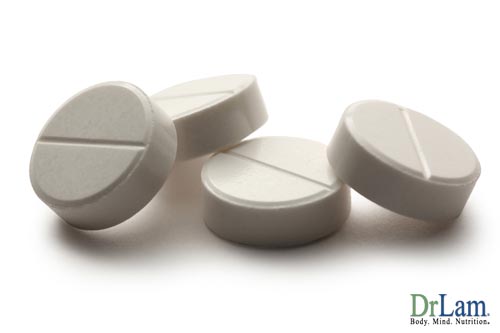 Sitting on an airplane or in a car for a long time
Sitting on an airplane or in a car for a long timeSome people are born with a tendency to develop clots. This tendency is inherited (it comes from your parents). Most of the time, increased clotting happens because protein C in the blood isn't doing its job properly. This condition is called "APC resistance" or "factor V Leiden."
In some people, the blood clots too much because their body doesn't make enough protein C or protein S. This is called "protein C deficiency," or "protein S deficiency," depending on which protein is missing. A few people don't have enough antithrombin III or have antithrombin III that doesn't work. Some people have an extra protein in their blood that causes too much clotting. This protein is called "lupus anticoagulant." Although it is called "anticoagulant," it actually causes clotting. Hypercoagulation has a few other causes, but those causes are rare.
Your doctor might think that you have a problem with hypercoagulation if you have any of the following:
If your doctor suspects you have hypercoagulation, tests can measure APC resistance, protein C, protein S and antithrombin III in your blood and can check for the lupus anticoagulant protein. The tests will also show if your proteins, the natural blood thinners, are working the right way.
Yes. Several medicines can thin your blood and make it less likely to clot. Some people with hypercoagulation only need to take blood thinners when they're in a situation that makes them more likely to form clots--like when they're in the hospital recovering from surgery, when they're in a car or airplane for a long time and when they're pregnant. Other people need to take medicine for the rest of their lives. Your doctor will decide which group you're in.
The two most common natural blood thinners are called heparin and warfarin. Your doctor will probably give you heparin first because heparin works right away. Heparin must be injected with a small needle under the skin. Once the heparin starts working, your doctor will probably have you start taking oral warfarin. Warfarin takes longer to begin working. Both are satisfactory natural blood thinners.
Both medicines can cause you to bleed more easily as they are both natural blood thinners. You might notice that, if you cut yourself, the blood takes longer to clot. You might bruise more easily. If you have any unusual or heavy bleeding, call your doctor.
Warfarin has a stronger effect on some people than on others. If you take warfarin, your doctor will want to check you often with a blood test called the PT-INR (International Normalized Ratio). This test will tell your doctor how well the warfarin is working. Some other medicines can make warfarin more or less strong. Ask your doctor before you take a new medicine, even nonprescription medicines and vitamins.
If you're pregnant, you shouldn't take warfarin. Warfarin can cause birth defects. Instead, you must use heparin until after you have your baby. If you want to get pregnant and you're already taking warfarin, talk with your doctor about changing to heparin. Sexually active women who take warfarin should use birth control.
Some natural substances have blood-thinning properties. A possible risk exists when taking such a product while also taking Coumarins (coumadin-like substances), salicylates (aspirin-like substances) and anti-platelets (substances that prevent blood cells from clumping together) as these are all considered blood thinners. Too much blood thinning can lead to excessive bleeding.
Herbs containing coumadin: angelica root, arnica flower, anise, asafoetida, celery, chamomile, fenugreek, horse chestnut, licorice root, lovage root, parsley, passionflower herb, quassia, red clover rue, sweet clover
Herbs thought to contain salicylates: Meadowsweet, poplar, willow bark
Herbs with Anti-platelet properties: bromelain, clove, onion, and turmeric
There are no documented reports of a proven interaction between Coumadin and any of these herbs. However, patients taking these herbs while on Coumadin should be closely watched for signs of bleeding. Herbs that potentially increase bleeding time should be stopped at least 2 weeks before surgery and not be taken until approval of the treating physician.
Nearly all available information on herb-Coumadin interactions is based on lab studies, animal studies, or individual case reports. Cause and effect relationships have not been proven. Available reports give limited information about the severity of these interactions. There is little reliable information about the safety and effectiveness of most herbal products. There are no regulations governing purity and potency of herbal products during manufacturing.
The following may increase bleeding risk: Angelica root, Arnica flower, Anise, Asafoetida, Bogbean, Borage seed oil, Bromelain, Capsicum, Celery, Chamomile, Feverfew, Garlic, Ginger, Ginkgo, Horse chestnut, Licorice root, Lovage root, Meadowsweet, Onion, Parsley, Passionflower herb, Poplar, Quassia, Red clover, Rue, Sweet Clover, Turmeric, Willow bark.
The following does increase bleeding risk: Danshen, Devil's claw, Dong quai, Papain, Vitamin E
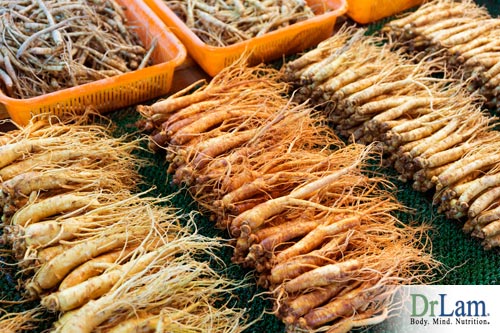 The following may lessen Coumadin's effect: Coenzyme Q10, Ginseng
The following may lessen Coumadin's effect: Coenzyme Q10, Ginseng
Vitamin E is usually taken as a food supplement. The RDA is 15 I.U per day. Most health conscious people take about 400 I.U. a day , and therapeutic dosages ranges from 400 to 1600 I.U. a day under the care of a knowledgeable physician.
As vitamin E is a fat-soluble vitamin, it is not recommended to consume a large dose of it when not under close supervision. The primary reason being that Vitamin E is a strong anti-oxidant and may slow down the rate of oxidation of vitamin K in the body. Vitamin K oxidation is essential to the body as it helps blood to clot. However, it must also be noted that the effects of vitamin E on PT time (a measure of bleeding time and therefore the coagulation status) varies. In other words, the reaction of each person may be different.
There was a case reported of a 55 year-old man who was on Coumadin and unknowingly took 1200 IU of vitamin E daily without the supervision of a doctor. The normal recommended amount is 400 IU to 800 IU a day and he was obviously taking an overdose of it. What happened then? The poor man developed blood vessel ruptures under the skin, had blood in his urine and a high PT time. When this happened, the doctor took him off vitamin E and his condition was stabilized. Later, he was again given a high dose at of vitamin E at 800 IU of vitamin E to provoke and confirm the response. Indeed, the provocation is positive and the same problems appear again. His intake of vitamin E was then stopped indefinitely. Within a week, his PT returned to normal.
A study was conducted on 12 patients who were on Coumadin. They were given 100 or 400 IU of vitamin E each day for a period of one month. The results showed no unusual bleeding in the patients who were given both dosages of vitamin E.
In another study, researchers Kim and White conducted a randomized, double-blinded study in which 4 patients were given 1200 IU vitamin E daily. Another 3 were given 800 IU daily and another 4 took placebo. All these patients took the vitamin E for a period of 4 weeks. During the study's second phase, which was single-blinded and not randomized, 6 of the subjects were given placebo or vitamin E. All of them were given 1200 IU daily for another 4 weeks. The results revealed that their INR did not increase to a point requiring Coumadin dose adjustment.
We can therefore safely conclude that taking Vitamin E up to 400 units per day does not affect the PT time in patients on Coumadin, generally speaking. But since each person is different, it is always good to consult your physician. A word of advise: If you are on natural blood thinners and taking vitamin E at the same time, have your INR checked 2 weeks after embarking on this combination. Close monitoring every month, at least for the first 3 months, should be carried out if you are on this combination therapy.
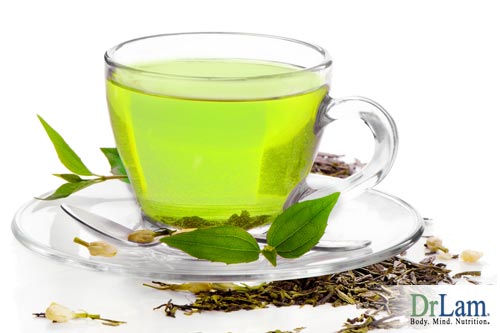 Green Tea (Camellia Sinensis), also known as Chinese tea is famous for its unique abilities to prevent cancers, treat stomach disorders and improve mental function. Although dried green tea leaves contain substantial amounts of vitamin K and may work against Coumadin, brewed green tea does not contain a significant amount of the vitamin. However, large amounts of brewed green tea may alter Coumadin's effects.
Green Tea (Camellia Sinensis), also known as Chinese tea is famous for its unique abilities to prevent cancers, treat stomach disorders and improve mental function. Although dried green tea leaves contain substantial amounts of vitamin K and may work against Coumadin, brewed green tea does not contain a significant amount of the vitamin. However, large amounts of brewed green tea may alter Coumadin's effects.
Research on green tea and bleeding time is not widely available. There are periodic case reports. In one case, the INR of a 44 year-old patient with a mechanical heart valve dropped tremendously when he took a large amount of brewed green tea. This patient originally had a normal INR of 3.79. After taking ½ to 1 gallon of brewed green tea daily for about a week, his INR dropped to 1.37.
Nevertheless, if you drink brewed green tea in moderate amounts, your INR should not drop so drastically.
Ginkgo (Ginkgo biloba) is a herb used to promote mental health and function. One of the components of Ginkgo called Ginkgolide B is known to reduce coagulation. It acts as a blood thinner, increasing blood flow to the brain and enhance memory. This herb have been used for centuries by Asians. When taking this supplement, we have to be very careful as several cases of bleeding were allegedly reported.
In one reported case, an elderly 70 year-old man took 40 mg of concentrated ginkgo extract twice a day for a period of one week. At the same time, he was also taking 325mg of aspirin daily. He complained of blurred vision and was diagnosed with a spontaneous hemorrhage in one eye.
A 33 year-old woman complained of headaches and was later diagnosed with bruises around her spine. She had been taking 60mg of ginkgo twice a day for 2 years.
In another report, a 72 year-old woman was diagnosed with a subdural bruise after taking 50mg of ginkgo 3 times a day for a period of 6 months. Interesting enough, she did not have any bleeding resulting from taking both Coumadin and ginkgo. However, it is strongly recommended those who are taking Coumadin avoid ginkgo-containing products.
Over many decades, Garlic (Allium sativum) is believed to have several cardiovascular benefits, such as blood pressure lowering, cholesterol lowering, and anti-stroke activity. Additionally, garlic oil can also reduce blood coagulation.
A researcher had indicated that when essential garlic oil was mixed with blood samples from healthy individuals, cells were less likely to clump together (coagulate) in a laboratory setting. Although there had been no documented reports of any serious interaction effects when taking both Coumadin and garlic, studies had implied that a serious reaction might be possible.
As such, patients who are on Coumadin should avoid excessive garlic supplements. However, by just eating food containing small amounts of garlic and small amount of garlic pills should not be a problem.
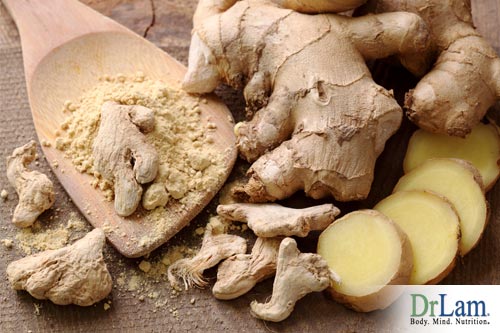 Traditionally, ginger (Zingiber officinale) has been taken to curb motion sickness and arthritis. Today, it has been reported to reduce blood clotting. Like the rest of the natural supplements mentioned above, taking ginger supplements, which contain a higher amount of ginger than any other food products may increase the risk of bleeding when taken with Coumadin.
Traditionally, ginger (Zingiber officinale) has been taken to curb motion sickness and arthritis. Today, it has been reported to reduce blood clotting. Like the rest of the natural supplements mentioned above, taking ginger supplements, which contain a higher amount of ginger than any other food products may increase the risk of bleeding when taken with Coumadin.
It is therefore highly recommended that patients taking both Coumadin and ginger supplements have their INR checked regularly. They should also ensure that symptoms of bleeding do not develop.
Coenzyme Q10 (CoQ10) is a compound made naturally in the human body, plant and animals. This compound is involved in electron transport and may be a free-radical scavenger, an antioxidant and a potent membrane stabilizer. CoQ10 is highly reputed for treating heart disease patients. It can also help to stabilize high blood pressure and angina.
The structure of CoQ10 is very similar to that of vitamin K 2. As such, it may have blood-coagulating effects. The vitamin K-like effects of CoQ10 have since been demonstrated in a laboratory setting and in the following reports:
If CoQ10 and Coumadin are taken simultaneously, patients should be monitored carefully for the first few weeks.
Hypercoagulation is a state where the blood in the body has an increased tendency to stick together. The causes are many, and a state of hypercoagulation is a medical condition normally managed by the administration of natural blood thinners such as coumadin or warfarin. Herbs and selected vitamins also have blood thinning effect. The most common and well known ones include gingko, vitamin E, and garlic, among others. Most people taking low preventative doses of these do not experience any adverse health problem such as excessive bleeding. To be safe, all patients currently on blood thinner medications should let their physician know the precise type and dosage of nutritional supplements being taken to avoid any side effect. Side effects can vary from person to person, and each person is different.
Those preparing for surgery should also be mindful to stop intake of nutritional supplements that potentially have blood thinner effect as least 2 weeks before surgery.
There are many mechanisms of action that give rise to heart palpitation. In the setting of AFS, a highly reactive sympathetic nervous system with resulting epinephrine overload is a common cause.
When you have AFS, the body is weak, and liquid supplements are easier and gentler for the body to digest and absorb.
Faster circulation increases oxygen delivery and supports better health. Arginine, an amino acid, is a precursor to nitric oxide, a gaseous hormone that can relax blood vessels and increase circulation.
Basic principles to breastfeeding, you need to be well hydrated, reducing stress levels, sleep as much as you can (rest) - get someone to help you take care of the baby during the daytime so you can rest in between feedings, eating well sufficiently to produce milk. Then you can consider using herbs to increase milk production. The most popular herbs formula generally include any of the following: Fenugreek, Red Raspberry, Blessed Thistle, Brewers Yeast (containing B vitamins), alfalfa, fennel, stinging nettle, goat’s rue, and Shatavari.
